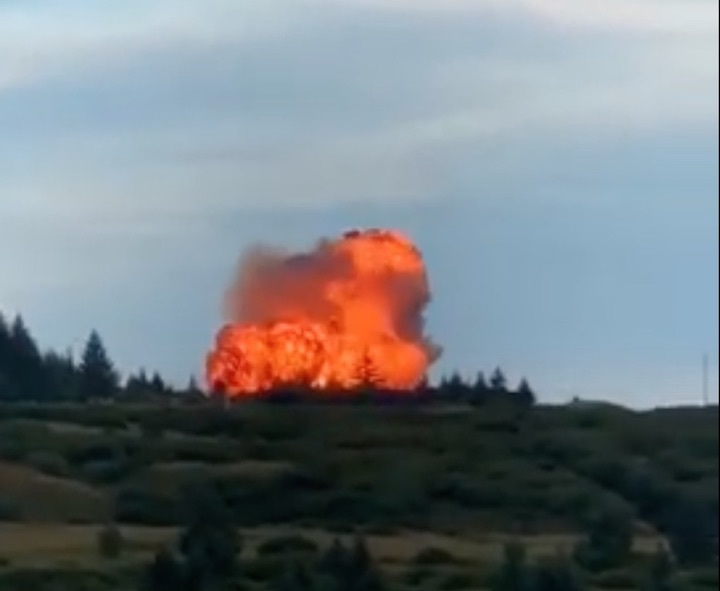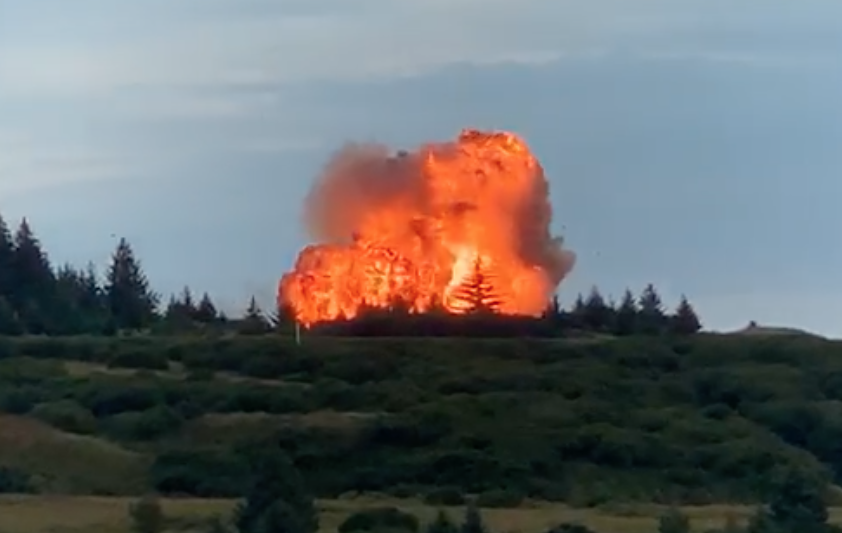13.09.2020

On Friday evening a rocket designed and built in less than a week left the Pacific Spaceport Complex on Kodiak Island and soared as expected — until it didn’t, and ended in a spectacular crash.

About 20 seconds into the flight, the rocket started oscillating and the mission was scrubbed, leading to the vehicle returning to earth where it met its fate in a fiery explosion, which was quickly contained.
Video of the impact was taken by Eric Van Dongen, who had been deer hunting nearby with his father Marc Van Dongen.
“Rocket launch in Kodiak, Alaska. Pretty cool,” Eric narrated. As the rocket fell back to earth, Marc can be heard saying it was heading to the place where the two had been hunting. After impact, a powerful shock wave boomed across them and the others who were gathered to watch.
“Holy mackerel, that’s unbelievable,” Marc can be heard exclaiming.
Eric Van Dongen Facebook video
The company that built the rocket says the launch was a success nonetheless. On its blog, Astra co-founders Chris Kemp and Adam London wrote:
“We’re excited to have our first orbital attempt under our belt! As we’ve always said, we expect it to take three flights to make it to orbit. Tonight, we saw a beautiful launch! Preliminary data review indicates the rocket performed very well. Early in the flight, our guidance system appears to have introduced some slight oscillation into the flight, causing the vehicle to drift from its planned trajectory leading to a commanded shutdown of the engines by the flight safety system. We didn’t meet all of our objectives, but we did gain valuable experience, plus even more valuable flight data. This launch sets us well on our way to reaching orbit within two additional flights, so we’re happy with the result.
“We are incredibly proud of what the team accomplished today. This was our first orbital launch attempt, and the first flight of a rocket designed from the ground-up for low cost mass production and highly-automated launch operations. The entire launch system was deployed by six people in less than a week – completely unprecedented.”
The company will be poring through launch data and making adjustments for the next launch. Astra began business in 2016 and by 2020 had built the Astra Space Port on Kodiak at the Pacific Spaceport Complex.
“We’ll be back to the pad before you know it,” they wrote.
Quelle: MUST READ ALASKA
+++
Kodiak rocket launch ends in fiery explosion

The Astra rocket launch in Kodiak Alaska on Sept. 11, 2020. (Courtesy of John Kraus / Astra)
Friday evening was clear and crisp in Kodiak when Astra’s 3.1 rocket lifted off just after 7:00 p.m. from the Pacific Spaceport Complex. Mark Van Dongen and his son, Eric, had been out deer hunting nearby and decided to watch the launch.
They drove to a pull-out on the road to the launch complex. Eric narrated as he shot video with his cell phone.
“Rocket launch in Kodiak, Alaska. Pretty cool,” he said, as the rocket roared straight up into the sky and quickly disappeared against a cloudy backdrop.
About 20 seconds later, the noise of the rocket’s engines abruptly stopped. Then it tumbled downwards.
The video captured Van Dongen’s reaction, after it hit the ground in a loud, fiery explosion.
“Holy Mackerel, that’s unbelievable,” he could be heard saying in the background. “I’m glad it didn’t throw any shrapnel this way.” Van Dongren noted that the rocket exploded in the area where they had been hunting.
They had left their hunting grounds in the afternoon, to avoid a widespread closure of the area surrounding the spaceport, which routinely takes place before a launch attempt.

Mark Lester, president of Alaska Aerospace Corporation, was in Kodiak for the launch of Astra’s rocket. He said no one was hurt and crews responded quickly to put out the fire.
“The launch was terminated early, which is part of our safety process,” Lester said. “We are prepared for these things.The key is public safety, and everything we did to keep the air, waterways and land free from the public is exactly why we do that in conditions like this.”
Lester said it’s too early to tell what caused the crash, which occurred on state land.
He called the launch itself a success, even though it didn’t get past its first-stage burn.
“Every test gives you new data,” Lester said. “It gives you new information.”
And that’s what Astra said in its blog, posted by the company’s founders, Chris Kemp and Adam London. They said despite the failed launch, they’re still happy with the result.
“We’re excited to have our first orbital attempt under our belt,” they wrote. “Tonight, we saw a beautiful launch! Preliminary data review indicates the rocket performed very well. Early in the flight, our guidance system appears to have introduced some slight oscillation into the flight, causing the vehicle to drift from its planned trajectory.”
The blog said this led to a “commanded shutdown of the engines by the flight safety system.”
“We didn’t meet all of our objectives, but we did gain valuable experience, plus even more valuable flight data.”
The blog said Friday’s launch sets the company on a path to reaching orbit within two additional flights.
Astra, which is based in Almeda, California, has been working to develop smaller, more cost-effective rockets to send telecommunications satellites to space. Last month, it made several attempts to send its 3.1 rocket into space but was hampered by weather, technical problems and in one case, a fishing boat that strayed into the safety zone.
Kemp and London said in their post that their 3.2 rocket is already built and ready to take the next step towards orbit.
“Stay tuned for updates over the next few weeks,” they wrote. “We’ll be back to the pad before you know it!”
On the company’s Twitter page, Elon Musk, the founder of SpaceX, offered a message of encouragement after Astra announced its launch had not made it past the first stage.
“Sorry to hear that,” Musk wrote. “I’m sure you’ll figure it out though. Took us four launches to reach orbit. Rockets are hard.”
Lester says the fact that Musk took the time to comment speaks to the difficulties of rocket development.
He said there are more than a hundred companies that want to make rockets, with only about 40 close to the testing phase.
“And then you have a very few, just a handful, if that, who are at the stage Astra is at,” Lester said.
Lester said a number of the team members involved in Friday’s launch are Alaskans.
“And this is what Alaskans do,” he said. “We face adversity. We overcome it. We get after it. We learn from it, and then we grow from it.”
As for the Van Dongens, they had planned to go back to the area where the rocket crashed. They had spotted a buck they wanted to pursue, but now they are left with emotional aftershocks from the explosion — feeling waves of sadness and wonder at the same time.
“I’ve never seen a missile failure like that, even on TV. When a rocket explodes, it usually explodes over the ocean or in the air,” said Mark Van Dongen. “And then to have it land right in the area that we were hunting in that morning. What are the odds that that was going to happen?
Van Dongen’s son, Eric, says he keeps studying his video, to try and understand exactly what it was he saw.
“It was a pretty crazy experience to watch,” said Eric, who said the shock wave that followed was even stranger. “It almost felt like you’re holding your breath for a couple of seconds and lightly pushed you back.”
“To witness something like that is pretty amazing, despite the fact the fact that a lot of money was lost, and time and effort,” he said. “A little boy was crying beside us. He wasn’t crying because of the explosion. He was crying because he wanted to see it launched in space.”
Maybe Astra’s next 3.2 rocket will make it into orbit, but a lot depends on how Astra’s team will be able to turn Friday’s failure into tomorrow’s success.
Quelle: KTOO
